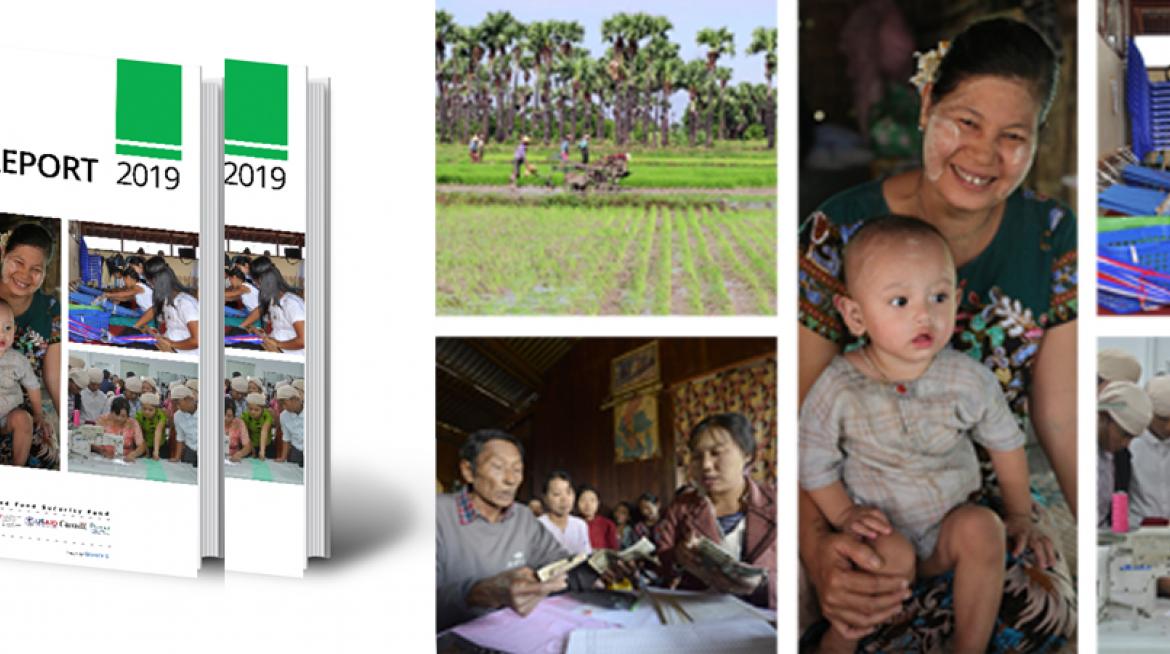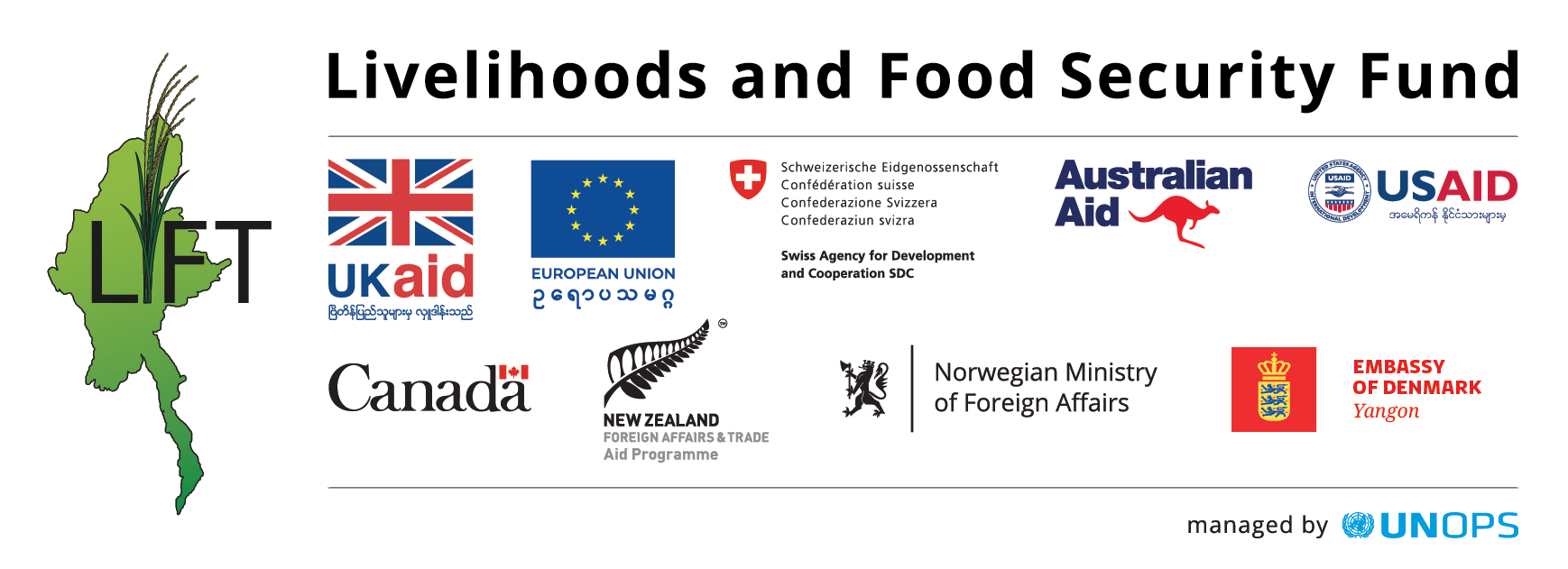
LIFT Annual Report 2019 outlines LIFT’s achievements in its 10th year of operations, supporting the most vulnerable in Myanmar.
The year saw LIFT adopt a refreshed strategy, its fourth one, with a sharpened focus on conflict-affected areas. This has meant an adjustment of the previous geographical structure to a blended approach of thematic programmes, designed and implemented as multi-sector interventions in the context of each geographical area. In 2019, the Delta and Dry Zone programmes started to be phased out as LIFT focused resources increasingly on conflict-affected, ethnic and border areas. Six calls for proposals/concept notes were issued, as the fund built its new thematic programmes and deepened reach in Kachin, northern Shan and the South East for 2019-2023.
During 2019, LIFT worked in 269 townships, representing 82 per cent of all of Myanmar’s townships. At the end of the year, 14.5 million rural people – or roughly 41 per cent of the country’s rural population – had been reached by LIFT. This represents a 26 per cent increase on the previous year.
LIFT managed more projects in 2019 than ever before: the Fund Management Office managed 100 grants in 2019, and at the end of 2019 there were 66 ongoing projects. LIFT worked with 65 partners and its cumulative budget increased from USD 509 million at the end of 2018 to USD 539 million at the end of 2019.
LIFT’s work in 2019 maintained attention on nutrition for mothers and children in the first 1,000 days of life through integrated programmes to address increased production and consumption of diverse and appropriate diets, social and behaviour change approaches to maternal, infant and young child feeding and WaSH, investment in fortified rice, and with the maternal and child transfer programme a continued focus and legacy of the Fund. By the end of 2019, the government’s contribution to the maternal and child cash transfer programme MCCT had risen from almost zero in 2017 to USD 29 million, with a further USD 22 million committed for 2020. LIFT has helped leverage 2.4 times its investment in MCCT from government funds to a total of USD 51 million over three years.
The Financial Inclusion Programme supported a more robust, inclusive rural financial market in Myanmar, helping people take advantage of economic opportunities, build assets, generate employment, manage risks and reduce poor people’s vulnerabilities to external shocks. In 2019, LIFT’s investment of USD 12 million in the second round of capital raising through the The Currency Exchange (TCX) swap market is expected to deliver an estimated USD 198 million in private sector co-financing to MFIs, a leverage of 27 times. LIFT’s 28 financial inclusion partners reached 3.8 million clients, 91 per cent of whom were women.
LIFT’s partners instigated 11 significant policy and legislative changes in 2019 on decent work and labour mobility. This included lifting the discriminatory ban on Myanmar’s domestic workers migrating abroad and drafting domestic legislation on labour protection for domestic workers to ensure they have the same rights as other workers. Sexual harassment was also successfully incorporated in the newly adopted Occupational Safety and Health Law, helping to address a major gap in Myanmar’s labour legislation. In addition, LIFT partners delivered safe migration services to 85,828 migrant workers and obtained USD 470,571 in financial remedies for those experiencing exploitation and abuse. Skills development training was delivered to 11,203 workers for non-farm livelihoods and 3,764 of these trainees were able to start a business or find sustainable employment.
In 2019, LIFT set up new programmes in Myanmar’s conflict-affected areas, with a focus on social cohesion and inclusion of displaced people and the most vulnerable. LIFT’s Kachin and northern Shan State programme is implemented in government- and non-government-controlled areas and is creating synergies with existing humanitarian and peace-building initiatives. To develop the integrated programme in the South East, LIFT conducted an extensive scoping mission and issued a call for concept notes, receiving 63 submissions, with the full programme being developed in 2020.
LIFT’s work in Rakhine State continued in 2019, amid increasing operational challenges as the security situation worsened in several townships of central and northern Rakhine. In line with the 2019-2023 strategy, increased efforts were made within LIFT’s programmes in Rakhine to promote inclusion, social cohesion, and peaceful coexistence. All of LIFT’s partners in Rakhine were supported by a specialist agency to mainstream conflict sensitivity within their programme and to identify areas where programmatic changes need to happen to mitigate and minimise risks of conflicts. The Rakhine Communication Hub was set up in June 2019 to improve local knowledge and awareness of ongoing development work and to bridge existing communication gaps between international partners, local communities and local organisations, and more than 94 partner staff (37 per cent women) were trained in media literacy, communication and media production. With more projects implemented in camps for internally displaced people and Muslim villages, LIFT now reaches more conflict-affected, deprived and marginalised groups than in the previous funding phase; in 2019, LIFT reached 189,315 people in Rakhine State: 68 per cent Rakhine and 32 per cent Muslims.
As the context in Myanmar continues to change, not least because of the global COVID-19 pandemic and the upcoming elections in November, the Livelihoods and Food Security Fund,, the Fund Management Office, the donors and partners remain agile and ready to adapt.
LIFT is funded by the United Kingdom, the European Union, Switzerland, Australia, the United States of America, Canada, New Zealand, Norway and Ireland.
For the full LIFT Annual Report 2019, see here.


